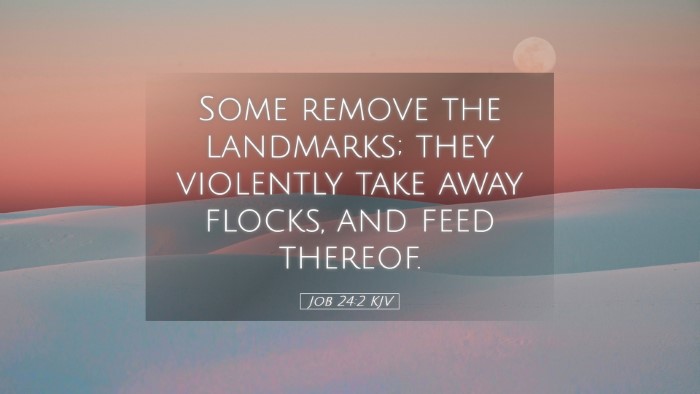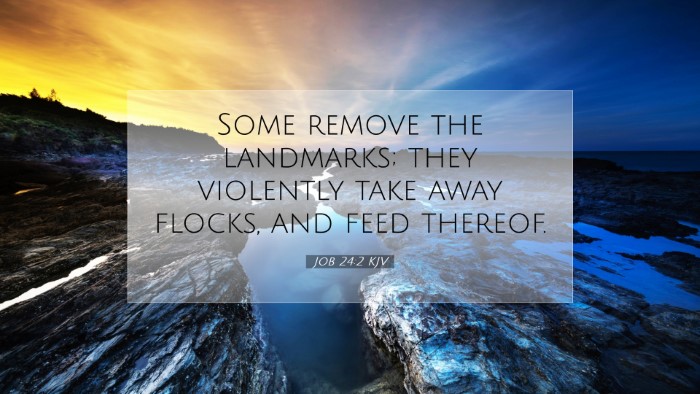Old Testament
Genesis Exodus Leviticus Numbers Deuteronomy Joshua Judges Ruth 1 Samuel 2 Samuel 1 Kings 2 Kings 1 Chronicles 2 Chronicles Ezra Nehemiah Esther Job Psalms Proverbs Ecclesiastes Song of Solomon Isaiah Jeremiah Lamentations Ezekiel Daniel Hosea Joel Amos Obadiah Jonah Micah Nahum Habakkuk Zephaniah Haggai Zechariah MalachiJob 24:2
Job 24:2 KJV
Some remove the landmarks; they violently take away flocks, and feed thereof.
Job 24:2 Bible Commentary
Commentary on Job 24:2
Verse: "Some remove landmarks; they violently take away flocks, and feed thereof." (Job 24:2)
Introduction
The book of Job encapsulates profound themes of suffering, justice, and the nature of God’s governance of the world. Job 24:2 addresses the unethical practices of certain individuals who disregard moral boundaries. This verse reflects on the violations of established norms and the impact of such actions on society. In this commentary, we will explore insights from several public domain sources, examining the implications of removing landmarks and unjust acts in light of God’s ultimate authority.
Contextualizing Job 24:2
In the broader narrative of Job, this verse is positioned within a discourse that highlights the disparity between the righteous and the wicked. Job, as a figure of righteousness suffering unjustly, contrasts starkly against those who thrive through immorality. It serves as an accusation against those who manipulate the order of society for their gains.
1. The Significance of Landmarks
Matthew Henry's Commentary: Landmarks signify boundaries set by authorities or custom that define property and moral order. By removing these landmarks, individuals not only rob their neighbors but also destabilize the fabric of society. They defy God’s ordinances that establish respect for one another’s rights.
This act of removing landmarks is akin to disregarding the moral laws that God has instituted. It reflects a broader pattern of disregard for divine order, leading to chaos and suffering—an idea echoed throughout scripture.
2. The Act of Violently Taking Away Flocks
Albert Barnes' Commentary: The phrase "violently take away flocks" indicates an aggression in actions that arise from greed. Such actions are not merely theft but are portrayed with a sense of violence that inflicts harm on others.
Barnes suggests that this violence can be seen in both physical and economic terms—those in power seize the livelihoods of the vulnerable without any moral grounding, illustrating a world where might often results in right, a notion that contradicts God’s justice.
3. Feeding on Others' Losses
Adam Clarke's Commentary: Clarke accentuates the idea that those who commit such acts satiate themselves at the expense of others. This feeding signifies taking nourishment from the despair and ruin of individuals wronged by such injustice.
This metaphor extends beyond mere sustenance; it suggests a deep moral degradation where offenders not only benefit from their ill actions but are sustained by them. The joy derived from unjust gains highlights a profound spiritual void within those who operate outside of God's laws.
Theological Implications
In understanding Job 24:2, we must grapple with its theological implications regarding divine justice. The silence of God in the face of such injustice can be troubling, especially for those who suffer. However, this passage reveals that God is fully aware of these transgressions.
- God's Justice is Certain: This verse is a reminder that while perpetrators may escape immediate retribution, there is divine justice. God’s timing differs from human understanding, and he will address all wrongs and rectify injustices.
- The Call for Accountability: The breach of moral law not only affects the victim but also calls for accountability among the community. Those who are aware must rally for righteousness and stand against oppression.
- The Role of the Church: In light of this verse, the church has a significant role to play. There is a call for pastors and leaders to address issues of justice within society and to guide their congregations in standing firm on the moral foundations laid by God.
Practical Applications for Today
Job 24:2 serves as a timeless reminder of the ethical responsibilities individuals and societies hold. Here are some practical applications:
- Awareness of Social Ethics: Individuals must remain aware of how societal actions impact others and strive to uphold societal landmarks—laws, customs, and ethical practices established within a community.
- Economic Justice: Churches and community organizations can advocate for those wronged by economic injustices, providing support and resources to lift individuals out of poverty.
- Education on Biblical Justice: Seminaries and theological institutions should incorporate teachings that address social justice from a biblical perspective, preparing future leaders to engage with contemporary issues thoughtfully.
Conclusion
Job 24:2 presents a poignant reflection on the human condition and the moral responsibilities that accompany it. As individuals navigate the complexities of ethics in society, this verse challenges believers to uphold God's standards of righteousness. Through a collective commitment to God's principles, communities can flourish, reflecting His justice and compassion in a world often marked by greed and violence.


